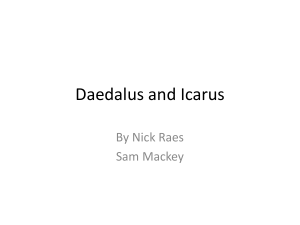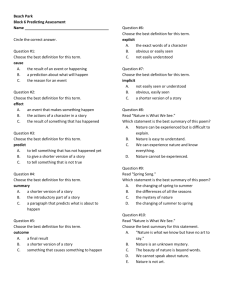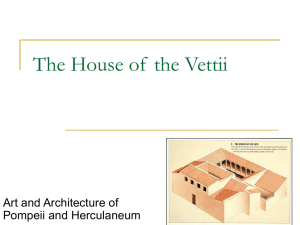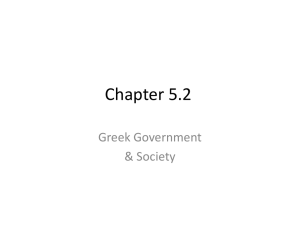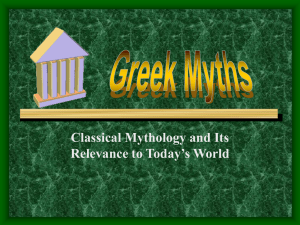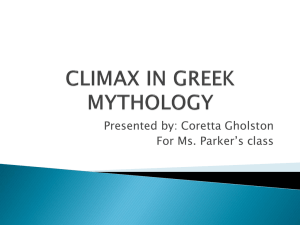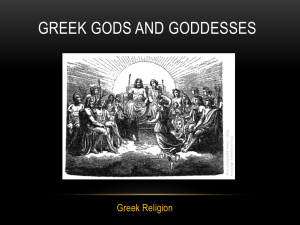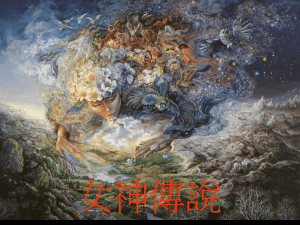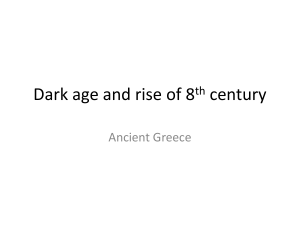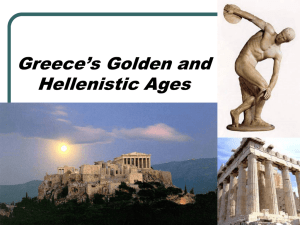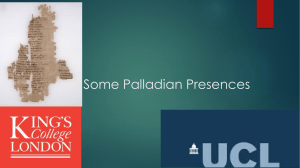Bronze Mythology Study Guide
advertisement
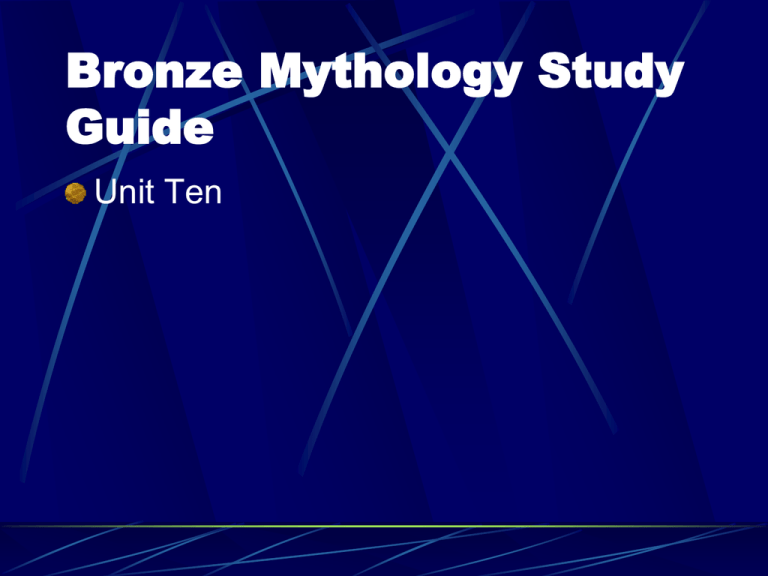
Bronze Mythology Study Guide Unit Ten A legend is a story that often contains larger-than-life characters and fantastic details. The action in “Popocatepetl and Ixtlaccihuatl” takes place before the Spaniards arrived in Mexico. The name Ixtlaccihuatl means the White Woman. The Emperor’s prohibition of marriage for Ixtla is a result of his selfishness. The Emperor changes his mind about Ixtla’s marriage when he is besieged by his enemies. Some of the warriors tell the Emperor that Popo has been killed in battle because they are jealous of Popo and want to spoil his triumphant return. According to the legend, Ixtla dies of a broken heart. The legend says that Popo punishes his enemies with the army of warriors watching, and no one tries to stop him. This description reveals the Aztec concept of justice. The link between the two pyramids and the two volcanoes in the story is a detail that is typical of legends. The character that says the magic words in “The People Could Fly” is Toby. In “The People Could Fly” the slaves flying away actually represent living a free life. In “The People Could Fly” Sarah wants to leave soon because she and her baby are being whipped. In “All Stories Are Anansi’s,” Anansi takes advantage of his victims’ foolishness. In “All Stories Are Anansi’s,” Anansi captures Osebo, the leapard, using a deep pit. In trickster folk tales such as “All Stories Are Anansi’s,” the hero relies on brains. The high price for stories in All Stories Are Anasasi’s”” suggests that the Ashanti culture honors the practice of storytelling. The word that best describes the character of the crow in “The Fox and the Crow” is vain. Myths make sense to us because they explain the world in human terms. In “Phaëthon, Son of Apollo,” the quarrel between Phaëthon and Epaphos results from the two boys’ pride. In Greek mythology, the god Apollo was linked to poetry, music, and the sun. In “Phaëthon, Son of Apollo,” when Apollo urges Phaëthon to be wise and make some other choice, we can predict that the chariot ride will turn out badly. When Pluto first sees Persephone in “Demeter and Persephone,” she is gathering flowers. When Zeus intervenes in “Demeter and Persephone,” his actions show that he is concerned with the preservation of the human race. The impact of the pomegranate in “Demeter and Persephone” is Persephone tasted this food of the underworld, so she cannot stay on Earth all year. In “Icarus and Daedalus,” the relationship between the two main characters is they are son and father. In “Icarus and Daedalus,” Daedalus associates sea gulls with liberty because sea gulls are independent and can fly freely to and from the island. From Daedalus’s reputation for cunning in “Icarus and Daedalus,” the reader can predict that after he is shut up in the tower he will probably attempt to escape. One lesson contained in “Icarus and Daedalus” is that People should steer a middle course. The cultural context of “Popocatepetl and Ixtlaccihuatl” is Aztec. In “The People Could Fly,” Toby speaks words from ancient Africa. A folk tale is a story that was composed orally. In “All Stories Are Anansi’s,” the gourd, the calabash, the vines, the bamboo pole, and the forest are part of the tale’s cultural context. The best explanation for the fact that many folk tales are very short is that short tales are more easily memorized. In “All Stories Are Anansi’s,” Nyame is the Sky God. According to Aesop’s fable “The Lion and the Statue,” the statue was made by a man. In order to trick the crow in Aesop’s fable “The Fox and the Crow,” the fox appeals to the bird’s vanity. The myth of Phaethon helps to explain the sun’s daily travel across the sky. A story such as “Demeter and Persephone,” which contains supernatural characters and explains basic features of the natural world, is best classified as a myth. The immediate cause for the disaster that befalls Icarus is the heat of the sun. When the titans ruled the world, life for both the gods and human beings was ______________________ Simple and happy After Zeus became ruler of the humans and the gods, what made life for human beings painful?_______ Harsh winters Why were the gods comfortable on Mount Olympus? ______________ They wore clothes and had fire Why did Prometheus choose to remain on Mount Olympus? ________________________ To guide Zeus and control his anger According to “The Origin of the Seasons,” the people who would be most likely to worship Demeter were ______________________ farmers Persephone’s duty or role was that of a_________________________ Spring maiden The only person who knew immediately what had happened to Persephone was _______________ Apollo During the seven months each year that Persephone must return to her husband, the weather is __________ Cold and bleak Arachne’s skill brings with it something dangerous-________________________ Too-great pride Minerva disguises herself as an old woman and calls of Arachne to __________________________ Overhear Arachne’s boasting In striking Arachne over the head, Minerva is _________________ Punishing her insolence Why does Arachne hang herself? __________________________________ Because of her injured pride In “The Reward of Baucis and Philemon,” Jupiter and Mercury journey to the land of Phrygia. What is the purpose of their journey? ________________________ We are not told The pair disguise themselves in order to better ___________________ Hide their divinity The Phrygians refuse the two hospitality because they are _________________________ Unfriendly and indifferent In deciding to punish the village, the gods view its inhabitants’ lack of hospitality as ____________ A major crime In his life, Hercules was opposed by ____________________ His father’s wife Why did Hercules undertake the twelve labors? ______________ As a slave, he did what he was told Hercules served as a slave for one year to Queen Omphale? __________________________ As a punishment by his father What is Hercules said to be doing now? ____________________________ He is enjoying peace and rest Short Answer What natural phenomenon does Popocatepetl’s torch attempt to explain? In “The People Could Fly,” the reader learns that after Toby flies off, the Overseer tells the story. The Master says it was a trick of the light and the Driver keeps his mouth shut. Why does the Driver do that? In “All Stories are Anansi’f,” what is the meaning of this statement? Anasi, the spider, yearned to be the owner of all the stories in the world…” In “The Fox and the Crow,” why does the Fox want to hear the Crow’s voice? How does the myth of Phaethon explain the origin of the Sahara desert in North America. What conflict does Zeus face in “Demeter and Persephone”? How does he resolve the conflict? Identify two clues in “Icarus and Daedalus” that help the reader predict what will happen to Icarus. What explanation is given in “Phaethon, Son of Apollo” for the movement of the sun? In “Icarus and Daedalus,” what does the myth convey to readers? Important Names in Greek Mythology Aphrodite-- Greek goddess of love and beauty Apollo-- Greek and Roman god of the sun Arachne-- An arrogant young woman who boasted of her skill in weaving to Minerva Athena-- Greek goddess of wisdom, arts, crafts, and war Atlas-- Titan whom Zeus punished by making Him hold up the sky on his shoulders Bacchus-- Greek god of wine, fertility, and drama Cronus-- The Titan who ruled the universe until he was overthrown by Zeus, his son. Daedalus-- An Athenian inventor and architect who built the Labyrinth for King Minos of Crete Demeter-- Greek goddess of agriculture and fertility. Eros-- Greek god of love, Aphrodite’s son. Fates-- Three goddesses who controlled human destiny and life Hades-- Greek god of the underworld Hera-- Zeus’ wife and queen of the gods Hercules--A Greek hero, the son of Zeus and Alcheme Hermes-- Messenger of the gods Icarus-- The son of Daedalus Persephone-- Greek goddess of spring and the underworld. Demeter’s daughter Phaethon-- Helios’ son. He was killed when he tried to drive the chariot of the Sun. Poseidon-- Greek god of the sea Prometheus-- The Titan who gave fire to mortals against the wishes of Zeus Titans-- A family of gods who ruled the universe before the Olympians Zeus-- Greek god of the sky and the weather, and king Of the gods of Olympus.
